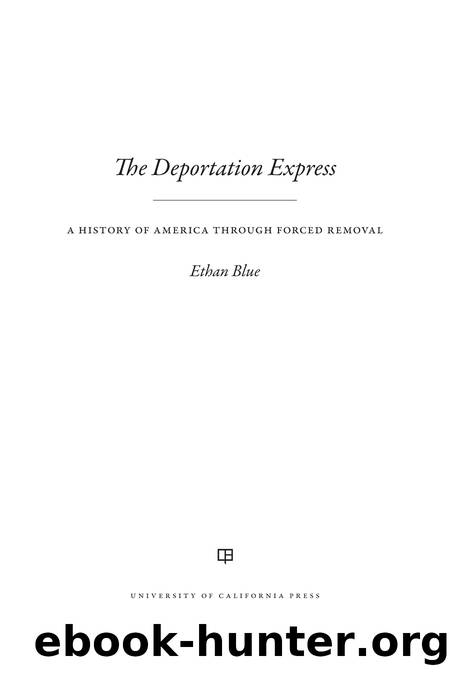The Deportation Express by Ethan Blue

Author:Ethan Blue
Language: eng
Format: epub
ISBN: 9780520304444
Publisher: University of California Press
Should a Korean be so fortunate as to elude the Japanese officers and safely enter another country he becomes a free man. But if he is deported .â.â. he will .â.â. be subject to inconceivable tortures and maltreatment to be relieved by death only. In the name of humanity and justice I invoke you to have compassion and exert every power within your authority to effect the admittance of these three Korean boys.
The young men would not become public charges, and he assured officials; they would be provided with appropriately gendered caregiving, including a Korean woman to look after the youngest. Without the bureauâs sympathetic and discretionary decision in their favor, he implored, the young men would face âincessant ordeals .â.â. by the Japanese whose cruelness and viciousness is beyond human conception.â27
The special investigation into whether or not the young Koreans should be permitted to land proved to their benefit. It also demonstrated the ethnoracial complexities of Korean American life in the early twentieth century, situated among the better-known (and differently vilified) Chinese and Japanese populations. Helen Bullis, a special inspectress for the bureau who more commonly worked on white slavery cases, reported to her superiors that âthere are not more than 15 or 16 Koreans in New York.â There had been more, but many moved into the interior of the United States, moved west, or else returned to Korea. Those who remained âform a very close-knit little colony.â28
Seek Hun Kimm struck Bullis as unreliable.29 He had previously worked with the Korean Embassy in Washington, DCâlikely the delegation developed after diplomatic relations were developed in the 1880s but before Japan took control in 1905âbut she did not take this as evidence of trustworthiness. He had no family, and his bachelorhood remained suspectâeven though multiple exclusion policies that portrayed all Asian women as prostitutes, and thus ineligible to land, in considerable measure created East Asian bachelor worlds.30 Moreover, his income was derived from a small business partnership with Chinese New Yorkers, which indicated to her his unreliability. He also moved to different addresses, which struck her as suspicious, but which he explained helped him avoid surveillance by the Japanese. It was not impossible to imagine this, given the fraught state of Korean nationalist resistance to Japanese occupation, but she dismissed it. Bullis gained a much more favorable impression from a missionary named Miss Clark, of Maywood, New Jersey. Clark had run a mission school in New Yorkâs Chinatown. Clark told Bullis that as a rule Koreans were âmuch less vicious than the Chinese, and much more reliable than the Japanese.â31 Bullis also spoke to May Woon Chun, a business partner of Kyring Chas. Lee. May Woon Chunâs son was currently attending Hastings College in Nebraska, studying agriculture.32 Hastings was a Presbyterian college founded in 1882, and it is likely that Protestant missionaries in Korea laid their path toward the school.33
Kyring Chas. Lee told Bullis that he intended for his cousin to go to Hastings College, too, and his eleven-year-old brother would live with a Korean family and attend school in New York.
Download
This site does not store any files on its server. We only index and link to content provided by other sites. Please contact the content providers to delete copyright contents if any and email us, we'll remove relevant links or contents immediately.
| Africa | Americas |
| Arctic & Antarctica | Asia |
| Australia & Oceania | Europe |
| Middle East | Russia |
| United States | World |
| Ancient Civilizations | Military |
| Historical Study & Educational Resources |
The Dawn of Everything by David Graeber & David Wengrow(1707)
The Bomber Mafia by Malcolm Gladwell(1622)
Facing the Mountain by Daniel James Brown(1553)
Submerged Prehistory by Benjamin Jonathan; & Clive Bonsall & Catriona Pickard & Anders Fischer(1455)
Wandering in Strange Lands by Morgan Jerkins(1426)
Tip Top by Bill James(1414)
Driving While Brown: Sheriff Joe Arpaio Versus the Latino Resistance by Terry Greene Sterling & Jude Joffe-Block(1374)
Red Roulette : An Insider's Story of Wealth, Power, Corruption, and Vengeance in Today's China (9781982156176) by Shum Desmond(1359)
Evil Geniuses: The Unmaking of America: A Recent History by Kurt Andersen(1352)
The Way of Fire and Ice: The Living Tradition of Norse Paganism by Ryan Smith(1336)
American Kompromat by Craig Unger(1315)
F*cking History by The Captain(1302)
It Was All a Lie by Stuart Stevens;(1300)
American Dreams by Unknown(1285)
Treasure Islands: Tax Havens and the Men who Stole the World by Nicholas Shaxson(1272)
Evil Geniuses by Kurt Andersen(1257)
White House Inc. by Dan Alexander(1211)
The First Conspiracy by Brad Meltzer & Josh Mensch(1173)
The Fifteen Biggest Lies about the Economy: And Everything Else the Right Doesn't Want You to Know about Taxes, Jobs, and Corporate America by Joshua Holland(1125)
